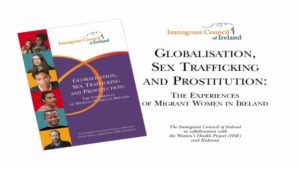An Evidence based campaign:
The recommendations advocated by TORL were all underpinned by a solid evidence base. Throughout the campaign research was conducted and data on key issues published to ensure that the campaign was based on clear evidence and data. This part of the report outlines the various sources that the campaign accessed and describes specifically the national research commissioned by a leading partner.
Firstly casework, and the direct experience of those exploited in the sex trade, were core to the campaign’s key recommendations. The campaign was continually informed by the experiences of women and girls in the sex industry through casework and survivor experiences. The direct experiences from those exploited in the sex industry were communicated, to demonstrate the need for this legal change. Client testimony, statistics and reports from organisations working directly with those affected by the sex trade were utilised in a number of ways.
 The testimony of a young client of the Immigrant Council Law Centre was paired with the red-light image synonymous to the campaign. This poster was used for public events, and put on the side of a truck which drove around the city centre in advance of the legislation going before Government.
The testimony of a young client of the Immigrant Council Law Centre was paired with the red-light image synonymous to the campaign. This poster was used for public events, and put on the side of a truck which drove around the city centre in advance of the legislation going before Government.
In addition, documenting the direct experience of those exploited in the trade highlighted information gaps on the sex industry and the campaign considered ways of progressing any data deficit.
After a roundtable discussion with representatives from Civil Society and the State sector, it was agreed that national research would be commissioned. This was to define the problem, to assess the breadth and extent of the commercial sex trade in Ireland, and consider relevant national and international responses. Members of the campaign agreed to also consider responses in other jurisdictions, examining varying responses and if, and how, these might be applicable in a national context.
Resulting research was commissioned by the Immigrant Council of Ireland, and supported by many frontline services, from state and civil society sectors, at national and EU levels. It took 21 months to conclude its work in researching the sex trade in Ireland. The research study, Globalisation, Sex Trafficking and Prostitution: The Experiences of Migrant Women in Ireland, looked at the sex trade, the experience of those in it, the links between human trafficking and prostitution and examined varying approaches deemed to be most effective in reducing both prostitution and trafficking. The evidence this unique study provided, the first of its kind in Europe, and provided the context and the evidence for the campaign’s key recommendations. More information on this specific research is outlined below.
 In addition, further research was commissioned, funded by the EU, to consider the buying patterns of men using prostitution. The Immigrant Council of Ireland led a five-country research project, focusing on demand for prostitution and the relevance of human trafficking in this context. The research examined men’s attitudes to buying sex, and what they believed to be effective deterrents. Again, the campaign considered international experiences and approaches, to inform the debate and subsequent recommended responses.
In addition, further research was commissioned, funded by the EU, to consider the buying patterns of men using prostitution. The Immigrant Council of Ireland led a five-country research project, focusing on demand for prostitution and the relevance of human trafficking in this context. The research examined men’s attitudes to buying sex, and what they believed to be effective deterrents. Again, the campaign considered international experiences and approaches, to inform the debate and subsequent recommended responses.
In addition to commissioning our own research, the campaign considered and communicated research and evidence available through other national and international studies. The campaign looked at the reality and  impact of the sex trade in other countries and the outcomes of the various approaches that have been adopted and evaluated. The members considered approaches in countries such as Sweden, the Netherlands, Germany and New Zealand, among others. The campaign interrogated the research findings and, where possible, supported this with a study visit to explore the findings in greater depth and how they might be relevant to the Irish context.
impact of the sex trade in other countries and the outcomes of the various approaches that have been adopted and evaluated. The members considered approaches in countries such as Sweden, the Netherlands, Germany and New Zealand, among others. The campaign interrogated the research findings and, where possible, supported this with a study visit to explore the findings in greater depth and how they might be relevant to the Irish context.
The importance of national research –
The national research commissioned by one of the key partners, the Immigrant Council of Ireland (ICI) was instrumental in providing data on the sex trade in Ireland, making visible the extent of it, the level of exploitation and some international perspectives to address it. The ICI recognised the critical need for research in providing an evidence base from which to develop practice and policy. The organisation commissioned a major piece of research to examine the trafficking of women and girls into Ireland (cited above).
Read our “national research” page to find out the steps taken to structure research which could support and influence advocacy.